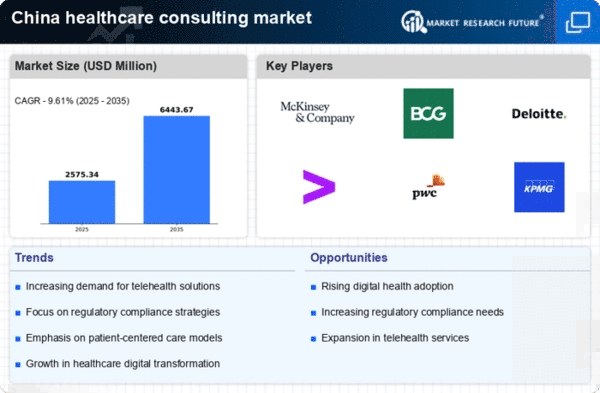Focus on Patient-Centric Care
The shift towards patient-centric care is significantly influencing the healthcare consulting-services market. In recent years, there has been a notable emphasis on enhancing patient experiences and outcomes. By 2025, it is anticipated that patient satisfaction metrics will become a key performance indicator for healthcare providers in China. This focus necessitates consulting services that can assist organizations in redesigning care delivery models to prioritize patient needs. Consultants are tasked with developing strategies that foster engagement, improve communication, and streamline processes to enhance the overall patient journey. As healthcare providers strive to meet these evolving expectations, the demand for specialized consulting services is likely to increase, reflecting a broader trend towards quality and personalized care.
Integration of Healthcare Systems
The integration of healthcare systems is emerging as a critical driver for the healthcare consulting-services market. As China moves towards a more interconnected healthcare ecosystem, the need for seamless integration of services and information systems is paramount. By 2025, it is projected that over 70% of healthcare organizations will prioritize interoperability to improve care coordination. This trend creates opportunities for consulting services that specialize in system integration, data sharing, and collaborative care models. Consultants are instrumental in guiding organizations through the complexities of merging disparate systems and ensuring that they function cohesively. The emphasis on integrated care not only enhances operational efficiency but also improves patient outcomes, thereby driving demand for consulting expertise in this area.
Rising Demand for Healthcare Services
The increasing demand for healthcare services in China is a primary driver for the healthcare consulting-services market. As the population ages and the prevalence of chronic diseases rises, healthcare providers are seeking expert guidance to enhance service delivery. In 2025, the healthcare expenditure in China is projected to reach approximately $1.2 trillion, indicating a robust growth trajectory. This surge necessitates consulting services to optimize operations, improve patient outcomes, and implement innovative care models. Healthcare organizations are increasingly turning to consultants to navigate the complexities of service expansion and to ensure compliance with evolving regulations. The healthcare consulting-services market is thus positioned to benefit from this growing demand, as providers seek to enhance efficiency and effectiveness in their operations.
Regulatory Changes and Compliance Needs
The dynamic regulatory environment in China is a significant driver for the healthcare consulting-services market. With ongoing reforms and updates to healthcare policies, organizations must remain compliant to avoid penalties and ensure operational continuity. In 2025, it is expected that compliance-related consulting services will account for a substantial portion of the market, as healthcare providers seek to navigate complex regulations. Consultants are essential in providing insights and strategies to help organizations adapt to these changes effectively. This includes guidance on licensing, reporting requirements, and quality standards. The increasing complexity of regulations underscores the necessity for expert consulting services, as organizations aim to mitigate risks and enhance their compliance frameworks.
Technological Advancements in Healthcare
Technological advancements are reshaping the landscape of the healthcare consulting-services market. Innovations such as telemedicine, artificial intelligence, and data analytics are becoming integral to healthcare delivery in China. As of 2025, it is estimated that over 60% of healthcare providers will adopt digital health solutions, creating a substantial need for consulting services to facilitate this transition. Consultants play a crucial role in helping organizations integrate new technologies, ensuring that they align with strategic goals and regulatory requirements. Furthermore, the ability to leverage data for decision-making is becoming increasingly important, prompting healthcare providers to seek expertise in data management and analytics. This trend indicates a growing reliance on consulting services to harness the potential of technology in improving healthcare outcomes.
















Leave a Comment